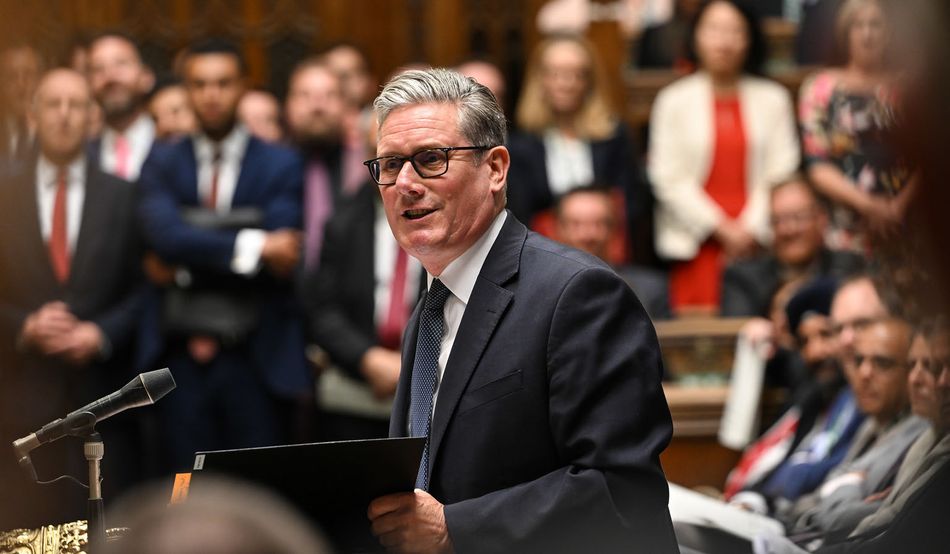In the evaluation of “Cactus Jack” Garner, the Texan vice president who eventually tired of providing conservative cover to Franklin Roosevelt, the Number Two title in US politics was “not worth a bucket of warm piss.” It’s tempting to dismiss Labour’s deputy leadership role—suddenly up for grabs after Angela Rayner’s resignation on Friday—in much the same way. When it comes to the power that will directly accrue to her successor, Cactus Jack remains a sound guide. And yet there’s a paradox here. The coming contest to acquire a traditionally impotent office could be convulsive, even profound.
The position has not proved a good springboard to the party’s leadership, still less No 10. The only postwar example of a deputy going on to become Labour leader is the unhappy case of Michael Foot. The most significant deputy leaders—such as George Brown or John Prescott—are not mainly remembered for changing party policy. Their principal role was to show to the part of the party that wasn’t best-pleased with an incumbent leader that it still had a seat at the table. One previous incumbent, the now little-remembered Ted Short, who deputised through Harold Wilson’s last four years, called his memoir I Knew My Place.
Rayner may look like a serious exception, because she certainly was a major force in the government. But this was because she had very specific ambitions on housing and workers’ rights, a major department to advance them and exceptionally sharp political antennae. It’s much less obvious that being the titular deputy provided much additional leverage once she got to Whitehall. There were always sharp limits to her sway on the government’s big strategic calls, as her frustrated—and leaked—appeal for a pivot towards more progressive taxes revealed earlier this year.
Keir Starmer has pre-empted the political battle for a new understudy within the party by immediately anointing David Lammy as deputy PM. This move underlines the reality that the coming internal party contest for a new deputy leader has no necessary read-across into the government, and bluntly signals that Starmer does not intend to be constrained by it in shaping his cabinet.
But if the office of Labour’s deputy leadership has proven inconsequential in Labour’s governing history, internal power struggles have repeatedly played out through the competition for it. Labour is known for being much less ruthless than the Tories in dispatching leaders. The party’s long-established culture of grumbling submission to incumbent leaders is sometimes traced even further back to the practical need for unions to hold together for effective industrial action. But there has not been the same inhibition in striking for the symbolic deputy post.
The cold war between the Bevanite left and the Labour right in the 1950s repeatedly flared into open battle when Aneurin Bevan went for the job of deputy. On the first two of these occasions, he was seeking to oust Peter Mandelson’s grandfather, Herbert Morrison, a man whose ideology-lite approach was encapsulated in his supposed definition of socialism as being simply “what a Labour government does in office.”
In the early 1980s, the choice of leader and deputy was widened out from MPs to give unions and ordinary members a say. Tony Benn immediately set out to test the new selectorate by launching a challenge against the serving deputy, the former chancellor and leading bruiser for the party’s right, Denis Healey. The bitter contest electrified the party across the country, which overwhelmingly backed Benn, but MPs and union bosses overpowered them—just—in a 50.4 to 49.6 per cent weighted total vote.
In the Corbyn years, when, exceptionally, the party was under the command of the left rather than the right, the continued existence of the middle-of-the-road elected deputy, Tom Watson, as a rallying point for centre-right MPs eventually drove the dominant radicals wild. There was no election, as such, but instead a series of arcane procedural votes of the sort that Labour has always specialised in. These manoeuvres aimed—ultimately unsuccessfully—to simply abolish the post.
Rayner’s exit as a minister is prompting certain anxieties about a handful of particular policies within the Labour movement. In particular, some are asking whether the business-friendly new housing and business secretaries, respectively Steve Reed and Peter Kyle, will follow through on her twin passions for council (rather than just private) homebuilding and much stronger protections for temps and shift workers. Although the Employment Rights Bill is in its very final stages, and not something that Starmer would ever simply drop, a lot about how it will operate turns on detailed ministerial regulations. Unions are suddenly fretting about the approach that the incoming team will take towards the job of implementing the legislation.
The coming battle for the powerless deputy leadership could easily become a proxy war over the party’s whole purpose and nature
The far bigger political issue, however, as pointedly crystallised by the usually mild-mannered Andy Burnham over the weekend, is the broader question of “balance”. A mere year after Labour’s landslide win, anyone with a close ear on the party is hearing a drip-drip of discontent from the rank and file. I have heard of recent resignations by stalwart activists, including the likes of branch secretaries who have until now helped keep local parties going. This is not mostly about the Corbynistas, who joined en masse to vote for their candidate in 2015 and very largely departed after he was excluded from the party. Rather, it is the crest of a wave of discontent which is seeping across the soggy centre of Labour.
Some of it is about the wear and tear of office: Labour activists have often struggled with the painful choices of government. This is inevitably true at a time when the public finances are dire. Most of it, however, is about a political style that engages with, and intermittently concedes to the right, while ignoring the left on the basis that it has nowhere else to go. This assumption, while still regarded as a truism by a great deal of lobby reporting, is increasingly debunked by political scientists who are finding that most of the voters that Labour is haemorrhaging are progressive types. This week’s events in France—where a centrist government looks set to fall because of its inability to find any accommodation with any significant part of the left—underlines the dangers.
In the classic Labour tradition, the coming battle for the powerless deputy leadership could easily become a proxy war over the party’s whole purpose and nature. The ruling clique is not without arguments: these are tough times; the voting system and status of the electoral map makes it suicidal to do anything other focus on the centre; it’s no use pretending that Middle England isn’t up in arms about small boats; it’s only a year since we proved our strategy was a winner. Its problem is that, aside from the person of Rayner and the priorities she was perceived as driving, it simply has too little to offer its own base as an explanation of what all this strategising is actually for.
That base looks on and contrasts hesitancy in explicitly calling out Israel’s mounting war crimes with haste in branding militant protestors against them as terrorists. It understands that the UK needs to do business with the United States, but increasingly doubts what can be achieved by kow-towing to Donald Trump. And in the face of a challenge from Reform, whose conference just welcomed as a hero a woman who was sentenced to 31 months last year for stirring up racial hatred, after she advocated torching hotels full of human beings, Labour activists despair at Starmer’s press operation. Only a few weeks ago, it saw fit to post a series of images of black men being detained and finger-printed by border officials. In the place of Harold Wilson’s insistence of Labour on a “moral crusade” this looks—in the eyes of many Labour loyalists—like the politics of moral surrender.
In sum, we are at a point where competing ideas of what Labour should be about are becoming increasingly hard to reconcile. And if history is any guide, at a time like this a deputy leadership race could be explosive, and very possibly damaging. It is difficult, however, to see how such a bruising show-down can be avoided. Any attempt to fiddle with the timetable, nomination requirements or the nature of the contest will—at best—defer the moment of reckoning.
Last but not least, there is the question of how Rayner herself will choose to play things. None of her past tensions with Starmer were on display in a warm and well-judged exchange of letters between the pair as she stepped down. Crucially, she got out quickly enough to avoid lasting damage in the eyes of Labour members. Many will continue to regard her as an icon of the sort of government that they would like to see. She may soon enough start to mull whether her future prospects are better served by hugging Starmer close or instead becoming the spokesperson for a change of direction. Should she choose the more disruptive course, it will become even clearer that the influence she has wielded was always less to do with the non-job of deputy leader, than with that rare strength: political personality.














